Extinction Rebellion protests: 'This is a last resort'
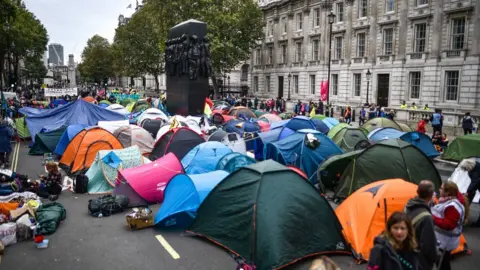 Peter Summers/Getty Images
Peter Summers/Getty ImagesThere is a festival atmosphere in Westminster as Extinction Rebellion activists emerge from their tents to stage a second day of protests in central London.
The roads around Parliament - normally full with traffic - are instead dotted with encampments of tents, gazebos and makeshift food points, where hundreds of protesters from across the country spent the night.
Volunteers serve bowls of porridge from a truck, while others bang drums and join sing-alongs.
One of those who camped overnight is Mikaela Loach, who travelled to London by bus from Edinburgh with a friend.
The 21-year-old says her decision to take part in this week's action was "a last resort".
"I've spoken to my local MP, I've taken part in protests. I just feel like I haven't been listened to," she says.
"I have been changing things in my lifestyle for a long time to try and be more eco-friendly but I had a realisation a few months ago that it doesn't matter if I go vegan or zero-waste if the government doesn't do anything. There need to be big structural changes."
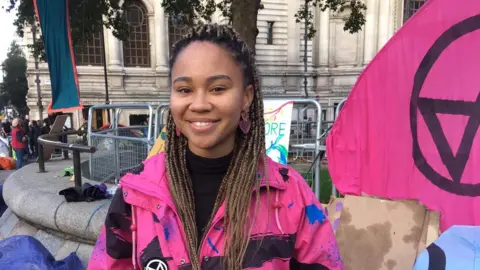
She admits the prospect of spending the night in a tent was a little daunting - but says spirits were high.
"I was a bit worried about police coming in the middle of the night but it was a really nice atmosphere, with the solidarity of having people around you that are here for the same cause," she says.
Government buildings were the focus on much of Tuesday's protests, with activists blocking nearby roads and gluing themselves to the Department for Transport building.
Mykehall, 32, from Glasgow, was one of several protesters to lock their arms inside a bin outside the department for business, energy and industrial strategy.
He says he wants to put pressure on government departments to reduce the country's reliance on fossil fuels, accusing them of "not taking the climate crisis seriously".
"We want the people that work here to realise that the public are not happy with how they are running things," he says.
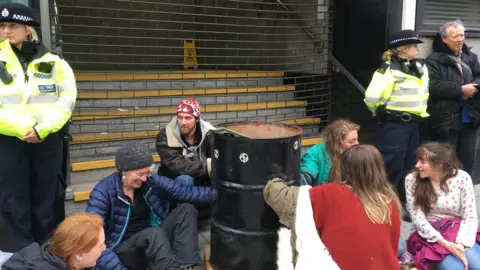
Others were arrested after attaching themselves to the underside of a lorry outside the Home Office, with activists telling me some had been there for 24 hours.
Despite a heavy police presence, the atmosphere remained relatively calm, with observers singing and shouting encouragement as the protesters were led away by officers.
However, not everyone supports Extinction Rebellion's methods - which include blocking bridges and major roads in central London, causing disruption for commuters and taking up significant police resources.
Prime Minister Boris Johnson even described the protesters "uncooperative crusties".
Among the activists there is little surprise at his reaction.
"He's just trying to discredit us. What do you expect?" one says.
Others pointed out that caring about climate change was a mainstream position - not just for so-called hippies - with families, professionals and students among those joining the protests.
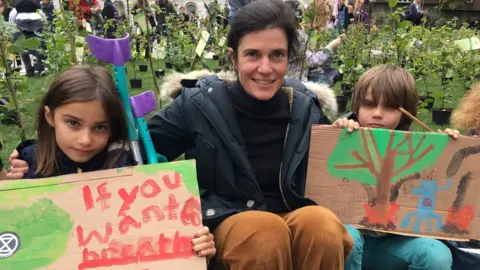
Jessica Aldos, 48, is one of those who brought along her children - who are seven and nine - to join the protests.
The family also took part in school climate change strikes earlier this year - although this time there was no need to miss lessons as their school was shut because of a burst water pipe.
They are among a crowd watching as protesters carry hundreds of potted trees to create a mini-forest opposite Parliament - in a symbolic call for government to plant billions of trees across the UK.
Each tree is dedicated to an MP, with protesters hoping they will be used to start reforesting the country.
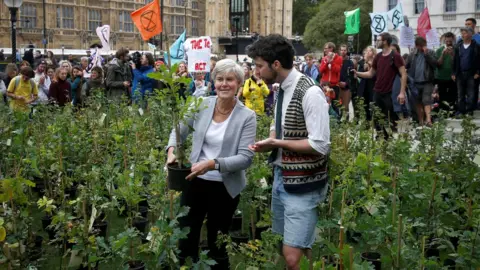 Reuters
ReutersMs Aldos, a teacher from Islington, north London, says she feels it is important to get her children involved in environmental activism.
"It's their lives that are going to affected," she says.
"They are scared about climate change and I think things like this make them feel they are doing something that can make a difference."
